"Panteão Romano" redireciona aqui. Não deve ser confundido com Pantheon, Roma.
Religion inancient Rome

Marcus Aurelius (cabeça coberta) sacrificando no templo de Júpiter
Practices and beliefslibationvotumtemplesfestivalsludifuneralsartimperial cultmystery religionsVer sacrumPriesthoodsPontificesAuguresVestalesFlaminesFetialesEpulonesFratres ArvalesDeitiesTwelve major godsCapitoline TriadAventine TriadUnderworldindigitamentaAgricultureBirth
Imperadores deificados:
Divus JuliusDivus AugustusRelated topicsGlossary of ancient Roman religionRoman mythologyAncient Greek religionEtruscan religionGallo-Roman religionInterpretatio graecaDecline
Vte
As divindades romanas mais conhecidas hoje são aquelas que os romanos identificaram com os colegas gregos (ver interpretatatio Graeca), integrando mitos gregos, iconografia e, às vezes, práticas religiosas na cultura romana, incluindo literatura latina, arte romana e vida religiosa como foi experimentada por toda parte o império. Muitos dos próprios deuses dos romanos permanecem obscuros, conhecidos apenas pelo nome e às vezes funcionam, através de inscrições e textos que geralmente são fragmentários. Isso é particularmente verdadeiro para os deuses pertencentes à religião arcaica dos romanos que remontam à era dos reis, a chamada "religião de Numa", que foi perpetuada ou revivida ao longo dos séculos. Algumas divindades arcaicas têm colegas itálicos ou etruscos, identificados tanto por fontes antigas quanto por estudiosos modernos. Em todo o império, as divindades dos povos nas províncias receberam novas interpretações teológicas à luz de funções ou atributos que compartilharam com as divindades romanas.
Uma extensa lista alfabética segue uma pesquisa de grupos teológicos, conforme construído pelos próprios romanos. Para o culto referente aos imperadores romanos deificados (divi), veja o culto imperial.
Títulos e honoríficos
Certos honoríficos e títulos poderiam ser compartilhados por diferentes deuses, personificações divinas, demi-Deus e divi (mortais deificados).
Augustus e Augusta
Augusto, "The Eleved On One One August" (forma masculina) é um honorífico e um título concedido a Otaviano em reconhecimento ao seu status único, ao extraordinário alcance de seus poderes e à aparente aprovação divina de seu princípio. Após sua morte e deificação, o título foi concedido a cada um de seus sucessores. Também se tornou um título ou honra quase onipresente para várias divindades locais menores, incluindo os Lares Augusti das comunidades locais e divindades provinciais obscuras, como o norte da África, Marazgu Augustus. Essa extensão de um honorífico imperial às divindades maiores e menores de Roma e suas províncias é considerada uma característica no nível do solo do culto imperial.
Augusta, a forma feminina, é um honorífico e o título associado ao desenvolvimento e disseminação do culto imperial aplicado às imperatrizes romanas, seja vivendo, falecido ou deificado como divina. O primeiro Augusta foi Livia, esposa de Octavian, e o título é então compartilhado por várias deusas do estado, incluindo Bona Dea, Ceres, Juno, Minerva e Ops; por muitas deusas menores ou locais; e pelas personificações femininas de virtudes imperiais como Pax e Victoria.
Bônus e Bona
O bônus do epíteto, "The Good", é usado na ideologia imperial com divindades abstratas, como Bona Fortuna ("Good Fortune"), Bona mens ("Bom pensamento" ou "Som Mind") e Bona Spes ("Esperança Válida, "Talvez seja traduzido como" otimismo "). Durante a República, o epíteto pode ser mais proeminente com Bona Dea, "The Good Goddess", cujos ritos foram celebrados pelas mulheres. O bônus Eventus, "Bom resultado", foi um dos doze divindades agrícolas de Varro e, posteriormente, representou o sucesso em geral.

Isis romano em mármore preto e branco, desde a época de Apuleius
Caelestis
A partir do período imperial médio, o título Caelestis, "celestial" ou "celestial", está ligado a várias deusas que incorporam aspectos de uma única deusa celestial suprema. O Dea Caelestis foi identificado com a constelação de Virgem ("a Virgem"), que detém o equilíbrio divino de justiça. Nas metamorfoses de Apuleius, o protagonista Lucius ora para a deusa egípcia helenística Ísis como Regina Caeli, "Rainha do Céu", que se diz se manifestar também como Ceres, "o pai nutritivo original"; Vênus celestial (Vênus caelestis); A "irmã de Phoebus", isto é, Diana ou Artemis, como ela é adorada em Éfeso; ou Proserpina como a deusa tripla do submundo. Juno Caelestis era a forma romanizada do tanit cartais.
Gramaticamente, a forma Caelestis também pode ser uma palavra masculina, mas a função equivalente a uma divindade masculina é geralmente expressa por sincretização com Caelus, como em Caelus aeternus iuppiter, "Júpiter, o céu eterno".
invicto
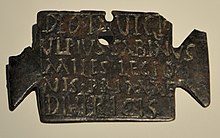
Dedicação feita ao Deus Invictus por um legionário romano em Brigetio, Panonia
Invictus ("Não para o Invincible") estava em uso como um epíteto divino no início do século II aC. No período imperial, expressou a invencibilidade das divindades adotadas oficialmente, como Júpiter, Marte, Hércules e Sol. Em moedas, calendários e outras inscrições, Mercúrio, Saturno, Silvanus, Fons, Serapis, Sabazius, Apollo e o gênio também são encontrados como Invictus. Cícero considera um epíteto normal para Júpiter, em relação a quem provavelmente é um sinônimo de Omnipotens. Também é usado nos mistérios mitraicos.
Mater e Pater
Mater ("Mãe") era um honorífico que respeitava a autoridade e funções maternas de uma deusa, e não necessariamente a "maternidade" em si. Os primeiros exemplos incluíram Terra Mater (Mãe Terra) e a Mater Larum (mãe dos Lares). Vesta, uma deusa da castidade, geralmente concebido como virgem, foi homenageado como Mater. Uma deusa conhecida como Stata Mater era uma divindade compital creditada pela prevenção de incêndios na cidade.
Da era imperial do meio, a imperatriz reinante se torna Mater Castrorum et Senatus et Patriae, a mãe simbólica de campos militares, o Senado e a pátria. A cavalaria gálica e germânica (auxilia) do exército imperial romano montou regularmente altares para as "mães do campo" (campestres, do campus, "campo", com as matadoras ou matroneas do título). Veja também Magna Mater (ótima mãe) a seguir.
Os deuses foram chamados Pater ("Pai") para significar sua preeminência e cuidados paternos, e o respeito filial lhes devia. Pater foi encontrado como um epíteto de DIS, Júpiter, Marte e Liber, entre outros.
Magna Mater
"A Grande Mãe" era um título dado a Cybele em seu culto romano. Algumas fontes literárias romanas concordam o mesmo título a Maia e outras deusas.
Coletivos
Mesmo em invocações, que geralmente exigiam nomeação precisa, os romanos às vezes falavam de deuses como grupos ou coletivos, em vez de nomeá -los como indivíduos. Alguns grupos, como as camenas e as parcaes, foram consideradas um número limitado de divindades individuais, embora o número delas não seja dado de forma consistente em todos os períodos e textos. Os grupos a seguir, no entanto, são inúmeros coletivos.
Tripartição espacial
Varro agrupou os deuses amplamente em três divisões do céu, terra e submundo:
di superi, the gods above or heavenly gods, whose altars were designated as altaria.di terrestres, "terrestrial gods," whose altars were designated as arae.di inferi, the gods below, that is, the gods of the underworld, infernal or chthonic gods, whose altars were foci, fire pits or specially constructed hearths.
Mais comum é um contraste dualista entre Superi e Inferi.
DI Indigetes e Novensiles
Os indigetos de Di pensaram -se em Georg Wissowa como as divindades indígenas de Roma, em contraste com os Novensides ou Novensiles, "Deuses recém -cheios". Nenhuma fonte antiga, no entanto, representa essa dicotomia, que geralmente não é aceita entre os estudiosos do século XXI. O significado do epíteto Indiges (singular) não tem consenso acadêmico, e Noven pode significar "nove" (novembro) em vez de "novo".
O deus romano lista
Tríades
Archaic Triad: Jupiter, Mars, Quirinus.Capitoline Triad: Jupiter, Juno, Minerva.Plebeian or Aventine Triad: Ceres, Liber, Libera, dating to 493 BC.
Agrupamentos de doze
Lectisternium of 217 BC
Um lectistério é um banquete para os deuses, no qual eles aparecem como imagens sentadas em sofás, como se estivessem presentes e participantes. Ao descrever o lectistério dos doze grandes deuses em 217 aC, o historiador de Augustan Livy coloca as divindades em pares equilibrados de gênero:
Jupiter–JunoNeptune–MinervaMars–VenusApollo–DianaVulcan–VestaMercury–Ceres
Complementos Divinos Male-Femininos como esses, bem como a influência antropomórfica da mitologia grega, contribuiu para uma tendência na literatura latina de representar os deuses como casais "casados" ou (como no caso de Vênus e Marte) amantes. [Citação precisava]

DI consentimentos em um altar
Dii Consentes
Varro usa o nome DII consentindo para doze divindades cujas imagens douradas estavam no fórum. Estes também foram colocados em seis pares de mulheres-mulheres. Embora os nomes individuais não estejam listados, eles são assumidos como as divindades do lectistério. Um fragmento de Ennius, em cuja vida ocorreu o lectistro, lista as mesmas doze divindades pelo nome, embora em uma ordem diferente da de Livy: Juno, Vesta, Minerva, Ceres, Diana, Vênus, Mars, Mercurius, Jove, Neptunus, Vulcanus, Apollo.
Os consentimentos da DII às vezes são vistos como o equivalente romano dos olímpicos gregos. O significado dos consentimentos está sujeito a interpretação, mas geralmente significa que eles formam um conselho ou consenso de divindades.
Di flaminales
The three Roman deities cultivated by major flamens
Jupitermarsquirinus
Twelve Roman deities attended by the minor flamens
CarmentisceresfalacerflorafurrinapalatuapomonaportunusvulCanvolturnustwo Outras divindades cujos nomes não são conhecidos
DI SELElecti
Varro fornece uma lista de vinte deuses principais da religião romana:
JANUSJUPITERSATURNGENIUSMERCURYAPOLOMARSVULCANNEPTUNESOLORCUSLIBERTELLUSCERESJUNOLOLUNADIANAMINERVAVENUSVESTA
Deuses Sabine
Varro, que era de origem de Sabine, fornece uma lista de deuses de Sabine que foram adotados pelos romanos:
FeroniaminervaNovensidespalessalUsfortUnofonsfideropsfloravediovissaturnSollunavulcansummanuslarundaterMinususquirinusvirtumnuslaresdianalucina
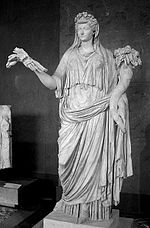
Livia, esposa de Augustus, vestida como a deusa Ops.
Em outros lugares, Varro afirma que Sol Indiges - que teve um bosque sagrado em Lavinium - como Sabine, mas ao mesmo tempo o equipara a Apollo. Dos listados, ele escreve: "Vários nomes têm suas raízes em ambos os idiomas, à medida que as árvores que crescem em uma linha de propriedade se aproximam de ambos os campos. Saturno, por exemplo, pode -se dizer que tem outra origem aqui, e também Diana".
Varro faz várias reivindicações de origens de Sabine ao longo de suas obras, algumas mais plausíveis que outras, e sua lista não deve ser tomada pelo valor de face. Mas a importância dos Sabines na formação cultural inicial de Roma é evidenciada, por exemplo, pelo seqüestro de noiva das mulheres Sabine pelos homens de Romulus e na etnia de Sabine de Numa Pompilius, Segundo Rei de Roma, a quem são atribuídos muitos das instituições religiosas e legais de Roma. Varro, no entanto, diz que os altares para a maioria desses deuses foram estabelecidos em Roma pelo rei Tatius como resultado de um voto (voto).
IndigitamentA
Artigo principal: IndigitamentA
Os indigitames são divindades conhecidos apenas ou principalmente como um nome; Eles podem ser entidades menores, ou epítetos dos principais deuses. Listas de divindades foram mantidas pelo Colégio de Pontiffs para garantir que os nomes corretos fossem invocados para orações públicas. Os livros dos pontífices são perdidos, conhecidos apenas através de passagens dispersas na literatura latina. As listas mais extensas são fornecidas pelos pais da igreja que procuraram sistematicamente desmascarar a religião romana enquanto se baseavam nas obras teológicas de Varro, também sobrevivendo apenas em fragmentos citados ou referenciados. W.H. Roscher reuniu a lista moderna padrão de indigitamenta, embora outros estudiosos possam diferir com ele em alguns pontos.
Lista alfabética
A

Um Apollo "Lizard-Slayer" em um mosaico da África Romana
Abundantia, divine personification of abundance and prosperity.Acca Larentia, a diva of complex meaning and origin in whose honor the Larentalia was held.Acis, god of the Acis River in Sicily.Aerecura, goddess possibly of Celtic origin, associated with the underworld and identified with Proserpina.Aequitas, divine personification of fairness.Aesculapius, the Roman equivalent of Asclepius, god of health and medicine.Aeternitas, goddess and personification of eternity.Aion (Latin spelling Aeon), Hellenistic god of cyclical or unbounded time, related to the concepts of aevum or saeculumAius Locutius, divine voice that warned the Romans of the imminent Gallic invasion.Alernus or Elernus (possibly Helernus), an archaic god whose sacred grove (lucus) was near the Tiber river. He is named definitively only by Ovid. The grove was the birthplace of the nymph Cardea, and despite the obscurity of the god, the state priests still carried out sacred rites (sacra) there in the time of Augustus. Alernus may have been a chthonic god, if a black ox was the correct sacrificial offering to him, since dark victims were offered to underworld gods. Dumézil wanted to make him a god of beans.Angerona, goddess who relieved people from pain and sorrow.Angitia, goddess associated with snakes and Medea.Anna Perenna, early goddess of the "circle of the year", her festival was celebrated March 15.Annona, the divine personification of the grain supply to the city of Rome.Antevorta, goddess of the future and one of the Camenae; also called Porrima.Apollo, god of poetry, music, and oracles, and one of the Dii Consentes.Arimanius, an obscure Mithraic god.Aura, often plural Aurae, "the Breezes".Aurora, goddess of the dawn.Averruncus, a god propitiated to avert calamity.B
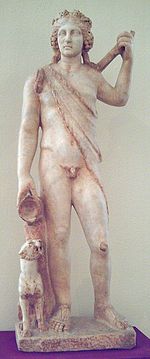
Um Baco da Espanha Romana, século III
Bacchus, god of wine, sensual pleasures, and truth, originally a cult title for the Greek Dionysus and identified with the Roman Liber.Bellona or Duellona, war goddess.Bona Dea, the "women's goddess" with functions pertaining to fertility, healing, and chastity.Bonus Eventus, divine personification of "Good Outcome".Bubona, goddess of cattle.CCaca, an archaic fire goddess and "proto-Vesta"; the sister of Cacus.Cacus, originally an ancient god of fire, later regarded as a giant.Caelus, god of the sky before Jupiter.Camenae, goddesses with various attributes including fresh water, prophecy, and childbirth. There were four of them: Carmenta, Egeria, Antevorta, and Postvorta.Cardea, goddess of the hinge (cardo), identified by Ovid with Carna (below)Carmenta, goddess of childbirth and prophecy, and assigned a flamen minor. The leader of the Camenae.Carmentes, two goddesses of childbirth: Antevorta and Postvorta or Porrima, future and past.Carna, goddess who preserved the health of the heart and other internal organs.Ceres, goddess of the harvest and mother of Proserpina, and one of the Dii Consentes. The Roman equivalent of Demeter [Greek goddess].Clementia, goddess of forgiveness and mercy.Cloacina, goddess who presided over the system of sewers in Rome; identified with Venus.Concordia, goddess of agreement, understanding, and marital harmony.Consus, chthonic god protecting grain storage.Cupid, Roman god of love. The son of Venus, and equivalent to Greek Eros.Cura, personification of care and concern who according to a single source created humans from clay.Cybele, an imported tutelary goddess often identified with Magna MaterDDea Dia, goddess of growth.Dea Tacita ("The Silent Goddess"), a goddess of the dead; later equated with the earth goddess Larenta.Decima, minor goddess and one of the Parcae (Roman equivalent of the Moirai). The measurer of the thread of life, her Greek equivalent was Lachesis.

Diana Nemorensis em um denário
Devera or Deverra, goddess who ruled over the brooms used to purify temples in preparation for various worship services, sacrifices and celebrations; she protected midwives and women in labor.Diana, goddess of the hunt, the moon, virginity, and childbirth, twin sister of Apollo and one of the Dii Consentes.Diana Nemorensis, local version of Diana. The Roman equivalent of Artemis [Greek goddess]Discordia, personification of discord and strife. The Roman equivalent of Eris [Greek goddess]Dius Fidius, god of oaths, associated with Jupiter.Di inferi, deities associated with death and the underworld.Disciplina, personification of discipline.Dis Pater or Dispater, god of wealth and the underworld; perhaps a translation of Greek Plouton (Pluto).E

A deusa do cavalo galo-romano Epona
Egeria, water nymph or goddess, later considered one of the Camenae.Empanda or Panda, a goddess whose temple never closed to those in need.Epona, Gallo-Roman goddess of horses and horsemanship, usually assumed to be of Celtic origin.FFalacer, obscure god. He was assigned a minor flamen.Fama, goddess of fame and rumor.Fascinus, phallic god who protected from invidia (envy) and the evil eye.Fauna, goddess of prophecy, but perhaps a title of other goddesses such as Maia.Faunus, god of flocks.Faustitas, goddess who protected herd and livestock.Februus, god of Etruscan origin for whom the month of February was named; concerned with purificationFebris, "Fever," goddess with the power to cause or prevent fevers and malaria.Fecunditas, personification of fertility.Felicitas, personification of good luck and success.Ferentina, patron goddess of the city Ferentinum, Latium, protector of the Latin commonwealth.Feronia, goddess concerned with wilderness, plebeians, freedmen, and liberty in a general sense.Fides, personification of loyalty.Flora, goddess of flowers, was assigned a flamen minor.Fornax, goddess probably conceived of to explain the Fornacalia, "Oven Festival."Fontus or Fons, god of wells and springs.Fortuna, goddess of fortune.Fufluns, god of wine, natural growth and health. He was adopted from Etruscan religion.Fulgora, personification of lightning.Furrina, goddess whose functions are mostly unknown, but in archaic times important enough to be assigned a flamen.GGenius, the tutelary spirit or divinity of each individualGratiae, Roman term for the Charites or Graces.H
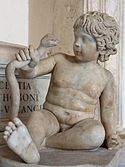
Estátua romana do bebê Hércules estrangulando uma cobra
Hercules, god of strength, whose worship was derived from the Greek hero Heracles but took on a distinctly Roman character.Hermaphroditus, an androgynous Greek god whose mythology was imported into Latin literature.Honos, a divine personification of honor.Hora, the wife of Quirinus.IIndiges, the deified Aeneas.Intercidona, minor goddess of childbirth; invoked to keep evil spirits away from the child; symbolised by a cleaver.Inuus, god of fertility and sexual intercourse, protector of livestock.Invidia, goddess of envy and wrongdoing.J
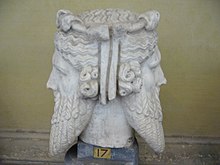
Uma escultura de janiform, talvez de Janus
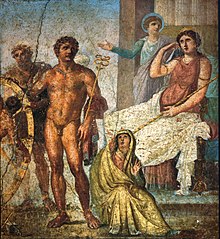
Punição de Ixion: no centro está Mercury segurando o caduceus e, à direita, Juno senta -se em seu trono. Atrás de sua íris e gestos. À esquerda está Vulcano (figura loira) em pé atrás do volante, gerenciando -a, com Ixion já ligado a ela. Nefele senta aos pés de Mercury; Um afresco romano da parede oriental do triclínico na casa de Vettii, Pompéia, Quarto Estilo (60-79 dC).
Janus, double-faced or two-headed god of beginnings and endings and of doors.Juno, Queen of the gods, goddess of matrimony, and one of the Dii Consentes. Equivalent to Greek Hera.Jupiter, King of the gods, god of storms, lightning, sky, and one of the Dii Consentes; was assigned a flamen maior. Equivalent to Greek Zeus.Justitia, goddess of justice.Juturna, goddess of fountains, wells, and springs.Juventas, goddess of youth.LLares, household gods.Latona, goddess of light.Laverna, patroness of thieves, con men and charlatans.Lemures, the malevolent dead.Levana, goddess of the rite through which fathers accepted newborn babies as their own.Letum, personification of death.[citation needed]Liber, a god of male fertility, viniculture and freedom, assimilated to Roman Bacchus and Greek Dionysus.Libera, Liber's female equivalent, assimilated to Roman Proserpina and Greek Persephone.Liberalitas, goddess or personification of generosity.Libertas, goddess or personification of freedom.Libitina, goddess of death, corpses and funerals.Lua, goddess to whom soldiers sacrificed captured weapons, probably a consort of Saturn.Lucifer, god of the morning starLucina, goddess of childbirth, but often as an aspect of Juno.Luna, goddess of the moon.Lupercus, god of shepherds and wolves; as the god of the Lupercalia, his identity is obscure, but he is sometimes identified with the Greek god Pan.Lympha, often plural lymphae, a water deity assimilated to the Greek nymphs.M

TRIAD Capitolina de Juno, Júpiter e Minerva
Mana Genita, goddess of infant mortalityManes, the souls of the dead who came to be seen as household deities.Mania, the consort of the Etruscan underworld god Mantus, and perhaps to be identified with the tenebrous Mater Larum; not to be confused with the Greek Maniae.Mantus, an Etruscan god of the dead and ruler of the underworld.Mars, god of war and father of Romulus, the founder of Rome; one of the Archaic Triad assigned a flamen maior; lover of Venus; one of the Dii Consentes.Greek equivalent-Ares.Mater Matuta, goddess of dawn and childbirth, patroness of mariners.Meditrina, goddess of healing, introduced to account for the festival of Meditrinalia.Mefitis or Mephitis, goddess and personification of poisonous gases and volcanic vapours.Mellona or Mellonia, goddess of bees and bee-keeping.Mena or Mene, goddess of fertility and menstruation.Mercury, messenger of the gods and bearer of souls to the underworld, and one of the Dii Consentes. Roman counterpart of the Greek god Hermes.Minerva, goddess of wisdom, war, the arts, industries and trades, and one of the Dii Consentes. Roman equivalent of the Greek goddess Athena.Mithras, god worshipped in the Roman empire; popular with soldiers.Molae, daughters of Mars, probably goddesses of grinding of the grain.Moneta, minor goddess of memory, equivalent to the Greek Mnemosyne. Also used as an epithet of Juno.Mors, personification of death and equivalent of the Greek Thanatos.Morta, minor goddess of death and one of the Parcae (Roman equivalent of the Moirai). The cutter of the thread of life, her Greek equivalent was Atropos.Murcia or Murtia, a little-known goddess who was associated with the myrtle, and in other sources was called a goddess of sloth and laziness (both interpretations arising from false etymologies of her name). Later equated with Venus in the form of Venus Murcia.Mutunus Tutunus, a phallic god.N

Netuno Velicans em um mosaico do século III.
Naenia, goddess of funerary lament.Nascio, personification of the act of birth.Necessitas, goddess of destiny, the Roman equivalent of Ananke.Nemesis, goddess of revenge (Greek), adopted as an Imperial deity of retribution.Neptune, god of the sea, earthquakes, and horses, and one of the Dii Consentes. Greek equivalent is Poseidon.Nerio, ancient war goddess and the personification of valor. The consort of Mars.Neverita, presumed a goddess, and associated with Consus and Neptune in the Etrusco-Roman zodiac of Martianus Capella but otherwise unknown.Nixi, also di nixi, dii nixi, or Nixae, goddesses of childbirth.Nona, minor goddess, one of the Parcae (Roman equivalent of the Moirai). The spinner of the thread of life, her Greek equivalent was Clotho.Nortia a Roman-adopted Etruscan goddess of fate, destiny, and chance from the city of Volsinii, where a nail was driven into a wall of her temple as part a new-year ceremony.Nox, goddess of night, derived from the Greek Nyx.OOps or Opis, goddess of resources or plenty.Orcus, a god of the underworld and punisher of broken oaths.PPalatua, obscure goddess who guarded the Palatine Hill. She was assigned a flamen minor.Pales, deity of shepherds, flocks and livestock.Panda, see Empanda.Parcae, the three fates.Pax, goddess of peace; equivalent of Greek Eirene.
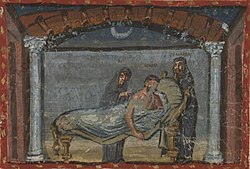
Enéias e os Penates, de um manuscrito do século IVI
Penates or Di Penates, household gods.Picumnus, minor god of fertility, agriculture, matrimony, infants and children.Picus, Italic woodpecker god with oracular powers.Pietas, goddess of duty; personification of the Roman virtue pietas.Pilumnus, minor guardian god, concerned with the protection of infants at birth.Pluto, Greek Plouton, a name for the ruler of the dead popularized through the mystery religions and Greek philosophy, sometimes used in Latin literature and identified with Dis pater or Orcus.Poena, goddess of punishment.[citation needed]Pomona, goddess of fruit trees, gardens and orchards; assigned a flamen minor.Porrima, goddess of the future. Also called Antevorta. One of the Carmentes and the Camenae.Portunus, god of keys, doors, and livestock, he was assigned a flamen minor.Postverta or Prorsa Postverta, goddess of childbirth and the past, one of the two Carmentes (other being Porrima).Priapus, imported phallic guardian of gardens.Proserpina, Queen of the Dead and a grain-goddess, the Roman equivalent of the Greek Persephone.Providentia, goddess of forethought.Pudicitia, goddess and personification of chastity, one of the Roman virtues. Her Greek equivalent was Aidôs.QQuerquetulanae, nymphs of the oak.Quirinus, Sabine god identified with Mars; Romulus, the founder of Rome, was deified as Quirinus after his death. Quirinus was a war god and a god of the Roman people and state, and was assigned a flamen maior; he was one of the Archaic Triad gods.Quiritis, goddess of motherhood. Originally Sabine or pre-Roman, she was later equated with Juno.RRobigo or Robigus, a god or goddess who personified grain disease and protected crops.Roma, personification of the Roman state.Rumina, goddess who protected breastfeeding mothers.S

Sol Invictus, ou Cristo retratado em seu disfarce. O século III dc
Salacia, goddess of seawater, wife of Neptune.Salus, goddess of the public welfare of the Roman people; came to be equated with the Greek Hygieia.Sancus, god of loyalty, honesty, and oaths.Saturn, a titan, god of harvest and agriculture, the father of Jupiter, Neptune, Juno, and Pluto.Securitas, goddess of security, especially the security of the Roman empire.Silvanus, god of woodlands and forests.Sol/Sol Invictus, sun god.Somnus, god of sleep; equates with the Greek Hypnos.Soranus, a god later subsumed by Apollo in the form Apollo Soranus.Sors, god of luck.Spes, goddess of hope.Stata Mater, goddess who protected against fires. Sometimes equated with Vesta.Sterquilinus ("Manure"), god of fertilizer. Also known as Stercutus, Sterculius, Straculius, Struculius.Suadela, goddess of persuasion, her Greek equivalent was Peitho.Summanus, god of nocturnal thunder.Sulis Minerva, a conflation of the Celtic goddess Sul and MinervaTTalasius, a god of marriageTellumo or Tellurus, male counterpart of Tellus.Tempestas, a goddess of storms or sudden weather, usually plural as the TempestatesTerra Mater or Tellus, goddess of the earth and land. The Greek equivalent is Gaea, mother of titans, consort of Caelus (Uranus).Terminus, the rustic god of boundaries.Tiberinus, river god; deity of the Tiber river.Tibertus, god of the river Anio, a tributary of the Tiber.Tranquillitas, goddess of peace and tranquility.Trivia, goddess of crossroads and magic, equated with Hecate.V

Vênus, Vulcan, Marte e Cupido em uma pintura de parede de Pompéia
Vacuna, ancient Sabine goddess of rest after harvest who protected the farmers' sheep; later identified with Nike and worshipped as a war goddess.Vagitanus, or Vaticanus, opens the newborn's mouth for its first cry.Vediovus or Veiovis, obscure god, a sort of anti-Jupiter, as the meaning of his name suggests. May be a god of the underworld.Venilia or Venelia, sea goddess, wife of Neptune or Faunus.[citation needed]Venti, the winds, equivalent to the Greek Anemoi: North wind Aquilo(n) or Septentrio (Greek Boreas); South wind Auster (Greek Notus); East wind Vulturnus (Eurus); West wind Favonius (Zephyrus); Northwest wind Caurus or Corus (see minor winds).Venus, goddess of love, beauty, sexuality, and gardens; mother of the founding hero Aeneas; one of the Dii Consentes.Veritas, goddess and personification of the Roman virtue of veritas or truth.Verminus, god of cattle worms.Vertumnus, Vortumnus or Vertimnus, god of the seasons, and of gardens and fruit trees.Vesta, goddess of the hearth, the Roman state, and the sacred fire; one of the Dii Consentes.Vica Pota, goddess of victory and competitions.Victoria, goddess of victory.Viduus, god who separated the soul and body after death.Virbius, a forest god, the reborn Hippolytus.Virtus, god or goddess of military strength, personification of the Roman virtue of virtus.Volturnus, god of water, was assigned a flamen minor. Not to be confused with Vulturnus.Voluptas, goddess of pleasure.Vulcan, god of the forge, fire, and blacksmiths, husband to Venus, and one of the Dii Consentes, was assigned a flamen minor.
Veja também
List of Metamorphoses charactersRoman polytheistic reconstructionismClassical planetsSeven Mesopotamian planetary deities
Para divindades menores conhecidas por uma única função ou por um único nome, consulte:
IndigitamentaList of Roman birth and childhood deitiesList of Roman agricultural deities
Várias figuras da mitologia grega que não faziam parte da prática religiosa romana aparecem nas narrativas mitológicas latinas e como alusões poéticas; Para esses nomes, veja:
List of Greek mythological figures
























